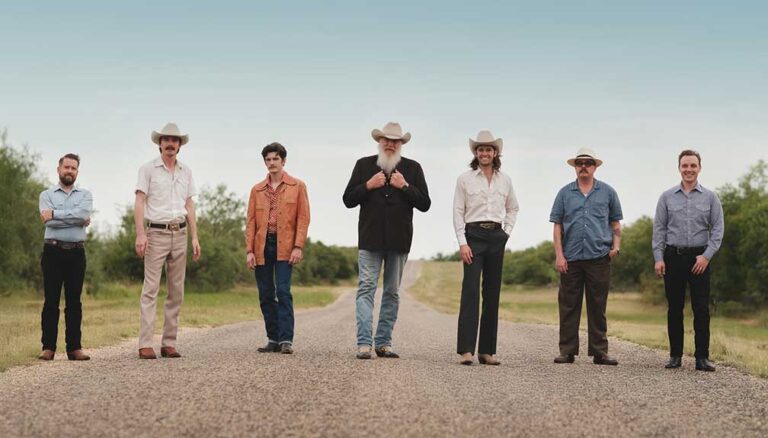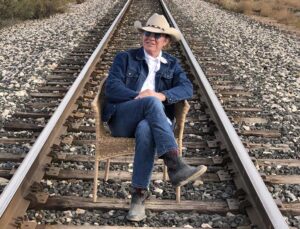It’s not often you’ll hear me talk about a Jewish native of Philadelphia carved out his mark as one of the most noted western swing performers of the modern era.
But that’s just what you have in Ray Benson, front man for Asleep at the Wheel. This long-haired, cowboy hat-wearing artist has been seen more often on the stages of Central Texas than in his native northeastern U.S.
The band was conceived in 1970 by Benson and his friends, Leroy Preston and Lucky Oceans. For the better part of the past half-century, the band has paid homage to the legendary “King of Western Swing” himself, Bob Wills.
How it all started
Ray Benson Seifert was born in 1951. Following his upbringing in southeastern Pennsylvania, he traveled to Antioch College in Yellow Springs, Ohio, dropping out in 1969 to pursue music.
Asleep at the Wheel was formed in Paw Paw, West Virginia, in 1970, when Benson, Preston and Oceans teamed up with Gene Dobkin and Chris O’Connell in 1970. Three years later, Willie Nelson lured thea group from opening Alice Cooper’s concerts to the progressive country music mecca of Austin, Texas. The rest, as they say, is history.
Over the years, Benson has seen many sides of the entertainment industry. In addition to being a singer, songwriter and music producer, he’s earned a name for himself as an actor and voice actor.
He’s been a solo singer and producer for singers like Dale Watson, Suzy Bogguss, Aaron Neville, Pam Tillis, Brad Paisely, Trace Adkins and Merle Haggard. He’s a founding member of the Rhythm and Blues Foundation and serves on the board of directors for several community health foundations in Texas.
But when it comes to entertainment notoriety, Asleep at the Wheel is where Benson gained his fame.
Long road to success
Despite the band’s long run at the forefront of western swing, commercial success — at least in terms of radio airplay — hasn’t come easy for Asleep at the Wheel.
A full 50 years after its release, “The Letter that Johnny Walker Read” continues to be the group’s highest charting single, coming in at No. 10. The song was recorded for “Texas Gold,” the group’s first album in its long relationship with Capitol Records.
Previously the group recorded under the Epic Records label, but disagreements about the quality of “The Letter that Johnny Walker Read,” along with a couple of other songs, led to Asleep at the Wheel’s departure.
Epic’s loss was Capitol’s gain. The success of “Texas Gold” was bolstered by two other singles from the album, “Bump Bounce Boogie” and “Nothin’ Takes the Place of You,” which both earned spots in the Top 40.
As for “Texas Gold,” it peaked at No. 7 on the top albums chart.
One of Asleep at the Wheel’s big breaks came in 1976 when they played on the early episodes of PBS television’s Austin City Limits. The show, which featured the likes of Willie Nelson and other central Texas artists in its early days, adopted the band as one of its favorites. Asleep at the Wheel has appeared on the show 11 times, the largest number of any performer to date.
But recognition in country music didn’t follow them. While Rolling Stone magazine named Asleep at the Wheel as best country western band in 1977, the group only managed a nomination for the Academy of Country Music’s Touring Band of the Year. The Country Music Association shut them out completely, considering them for no honors at all.
Changing times
The 1980s were difficult for Asleep at the Wheel. Two founding members left the band, and the group spent a lot of time making music for television commercials rather than chasing success in the country music scene.
It wasn’t until the late 1980’s that the band released “10,” an album that won a Grammy for Best Country Instrumental. It was the band’s second such recognition. Texas fiddler’s Johnny Gimble’s appearance on the album led to accolades, Gimble himself having become a staple of western swing. The album also introduced Benson as a producer. A year later, the band took a third Grammy for “Western Standard Time.”
The 1990s were more successful for Asleep at the Wheel as the band became better organized under the direction of Benson. Appearing in the movie “Wild Texas Wind” won the band acclaim. But perhaps its greatest contribution yet came two years later when the group released “A Tribute to Bob Wills and the Texas Playboys.” A second tribute album, “Ride with Bob” came before the decade was out and garnered two more Grammys. Both were well received from the critical standpoint.
Despite Asleep at the Wheel’s success with the Grammys — the band has won eight such awards to date — in terms of touring, it has almost always been an opening act. The group has appeared with Willie Nelson, George Strait and countless others.
Along the way, the band also won additional recognition from the Academy of Country Music, having been nominated for awards on nine occasions. But in terms of hit records, the No. 1 spot on the charts has always eluded them.
Over the course of Asleep at the Wheel’s history, the band has released a total of 26 studio albums, 16 live albums and 40 singles. Traditional western swing tunes like “Take Me Back to Tulsa,” “Miles and Miles of Texas,” “House of Blue Lights” and “Lay Down Sally” have sparked the group’s discography.
Today, in 2025, Asleep at the Wheel is still working and touring, and they’ve released a number of music videos since the turn of the century. The television medium that began with Austin City Limits has paid dividends, as the band’s music naturally flows between the audio and visual aspects of entertainment. The 21st century has also brought attention to the band from local critics, with the Austin Music Awards regularly recognizing Asleep at the Wheel’s work.
Fifty-five years after its founding, Asleep at the Wheel is still making waves — and with Ray Benson as the only remaining founding member, the long-haired troubadour can largely be credited with the band’s enduring success.
Since retiring from a career as an outdoor recreation professional from the State of Arkansas, Kris Rutherford has worked as a freelance writer and, with his wife, owns and publishes a small Northeast Texas newspaper, The Roxton Progress. Kris has worked as a ghostwriter and editor and has authored seven books of his own. He became interested in the trucking industry as a child in the 1970s when his family traveled the interstates twice a year between their home in Maine and their native Texas. He has been a classic country music enthusiast since the age of nine when he developed a special interest in trucking songs.










